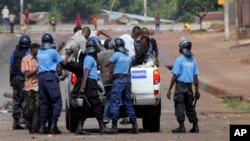DAKAR, SENEGAL —
A court in Guinea has charged the governor of the capital in a case of alleged torture of civilians. Human rights advocates are hailing the move as a significant step in Guinea’s long fight against impunity. Guineans say it is an important victory but the greatest challenges lie ahead.
The charges against Conakry governor Sekou Resco Camara stem from an incident during the 2010 presidential campaign when soldiers arbitrarily rounded up and detained youths after protesters threw stones at an official motorcade.
Thierno still has problems with his vision from being beaten in the head in 2010. He says he and many others who were rounded up that day had nothing to do with the protests and were randomly targeted by security forces.
He says it is very important that these officials account for their acts. He says countless Guineans continue to suffer from physical abuse by security forces; this is just the way it has always been in Guinea and we have yet to see any prosecutions. It is important for the future of the Guinean people, he says, that offenders be brought to justice.
Aliou Barry, president of the Guinean Human Rights Observatory, says, Guineans fighting for justice are encouraged, but worried at the same time because Camara remains governor of the capital, Conakry.
He says as someone who continues to wield significant power, Camara could easily make reprisal attacks against those involved in pursuing the case. He says we are very pleased with this step but we are vigilant above all.
Barry says this process must not stop at just charges being brought.
The International Federation for Human Rights, which has been working with victims of the 2010 case, called the court’s move a significant advance in Guinea’s fight against impunity.
A stadium massacre in Conakry in September 2009 threw Guinea into the spotlight, but was just part of a long history of human rights violations.
Guinea has seen some advances in recent months, including the creation of a government ministry for human rights and civil liberties, and charges being brought in the stadium case. But the country, which had military rule and dictatorship for decades, has a long way to go in battling impunity. No one has been prosecuted for the stadium attack or countless other attacks on civilians by security forces over decades.
Torture is not a crime under Guinea’s current penal code, but the country has ratified the international convention against torture. Civil society groups are working toward a national law criminalizing torture.
The charges against Conakry governor Sekou Resco Camara stem from an incident during the 2010 presidential campaign when soldiers arbitrarily rounded up and detained youths after protesters threw stones at an official motorcade.
Thierno still has problems with his vision from being beaten in the head in 2010. He says he and many others who were rounded up that day had nothing to do with the protests and were randomly targeted by security forces.
He says it is very important that these officials account for their acts. He says countless Guineans continue to suffer from physical abuse by security forces; this is just the way it has always been in Guinea and we have yet to see any prosecutions. It is important for the future of the Guinean people, he says, that offenders be brought to justice.
Aliou Barry, president of the Guinean Human Rights Observatory, says, Guineans fighting for justice are encouraged, but worried at the same time because Camara remains governor of the capital, Conakry.
He says as someone who continues to wield significant power, Camara could easily make reprisal attacks against those involved in pursuing the case. He says we are very pleased with this step but we are vigilant above all.
Barry says this process must not stop at just charges being brought.
The International Federation for Human Rights, which has been working with victims of the 2010 case, called the court’s move a significant advance in Guinea’s fight against impunity.
A stadium massacre in Conakry in September 2009 threw Guinea into the spotlight, but was just part of a long history of human rights violations.
Guinea has seen some advances in recent months, including the creation of a government ministry for human rights and civil liberties, and charges being brought in the stadium case. But the country, which had military rule and dictatorship for decades, has a long way to go in battling impunity. No one has been prosecuted for the stadium attack or countless other attacks on civilians by security forces over decades.
Torture is not a crime under Guinea’s current penal code, but the country has ratified the international convention against torture. Civil society groups are working toward a national law criminalizing torture.








